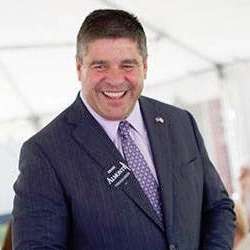
by: Phil Eil • 630WPRO.COM
It’s almost over.
By “it,” of course, I mean the Rhode Island election cycle, or season, or pageant of democracy, or whatever you call the thing that’s taken over our airwaves, lawns, billboards, mailboxes, Twitter feeds, and TV screens.
Tomorrow, a depressingly small fraction of eligible voters will head to polling places across the state to cast votes in races for governor, lieutenant governor, attorney general, secretary of state, general treasurer, US representative, US senator, a total of 113 General Assembly seats, and various city- and town-specific positions.
And let’s not forget ballot questions. Voters in Barrington will face 47ballot questions on Tuesday, including, “Shall the maximum fine for disorderly conduct at a Financial Town Meeting be increased from twenty dollars ($20.00) to one hundred dollars ($100)?” and, “Shall various grammatical errors and archaic language throughout the Charter be corrected and updated, and shall statutory and other references be added as necessary?” If you live in Barrington, you have my full encouragement to stop reading this article and start studying.
As for everyone else, I’ve tried to make some sense of the long, expensive, colorful, frustrating political smorgasbord that ends when polls close tomorrow night.
Care to join me?
HOW LONG HAS ALL OF THIS BEEN GOING ON?
 It’s tough to pinpoint exactly when the madness began. Was it in May of 2012, 30 months before Election Day, when former state Auditor General Ernie Almonte filed paperwork to run for governor? (He has since hopped to the treasurer’s race.) Was it Rhode Island Public Radio political reporter Ian Donnis’s blog post three months later, titled, “Who’s the Next Mayor of Providence? 16 Names to Consider”?
It’s tough to pinpoint exactly when the madness began. Was it in May of 2012, 30 months before Election Day, when former state Auditor General Ernie Almonte filed paperwork to run for governor? (He has since hopped to the treasurer’s race.) Was it Rhode Island Public Radio political reporter Ian Donnis’s blog post three months later, titled, “Who’s the Next Mayor of Providence? 16 Names to Consider”?
I would argue that the action began, however slowly, in May of 2013 — about a year and a half before Election Day. That was the month Guillaume de Ramel declared his Democratic candidacy for Secretary of State, Ken Block declared himself a Moderate candidate for governor (he would later become a Republican), and political-sounding URLs like mikeforprovidence.com began popping up online. The following month brought a Providence mayoral campaign kickoff for Dr. Dan Harrop (at a restaurant that no longer exists) and two high-profile, out-of-state fundraisers for an as-yet-undeclared-for-governor General Treasurer Gina Raimondo. The political chatter has only amplified since.
Of course, not everyone needs a long runway to take off. The Shortest Campaign Award for 2014 goes to former Providence Mayor Vincent “Buddy” Cianci, who saved his candidacy declaration — made live on WPRO’s “The Buddy Cianci Show” — for the final minutes before the June 25, 2014 filing deadline. In doing so, Buddy signed up for a 132-day campaign sprint, compared to Dr. Harrop’s 502-day slog. And Buddy’s run was effectively even shorter than that, since he didn’t kick his campaign into full swing until the day after September 9’s primary election, less than two months before November 4.
RI’S HIGHEST PROFILE RACE
 Speaking of hizzoner, the real question for 2014 isn’t, “Which Rhody race garnered the most national buzz?” It’s, “Just how much chatter did Buddy’s post-prison run get?”
Speaking of hizzoner, the real question for 2014 isn’t, “Which Rhody race garnered the most national buzz?” It’s, “Just how much chatter did Buddy’s post-prison run get?”
I’ve counted at least 20 non-Rhode Island media outlets that have produced original stories or segments on “Buddy 3.0”: the New York Times, Los Angeles Times, Wall Street Journal, Washington Post, Boston Globe, Esquire, Economist, Boston Magazine, Weekly Standard, New Yorker, Harvard Political Review, Daily Beast, Politico, CNN.com, CBS’s Sunday Morning Show, NBC’s Meet the Press, PBS’s NewsHour, and MSNBC’s Hardball, The Daily Rundown, and Up with Steve Kornacki.
Oh, and you can add Salon to that list. I know the guy who wrote that piece.
HOW MUCH MONEY HAS BEEN SPENT?
 As far as I can tell, no one has tallied every expenditure from every 2014 race in Rhode Island. But we do have a few numbers to bring the picture into sharper focus.
As far as I can tell, no one has tallied every expenditure from every 2014 race in Rhode Island. But we do have a few numbers to bring the picture into sharper focus.
WPRI.com’s Ted Nesi recently reported that the five major pre-primary gubernatorial candidates “spent a combined $12.3 million on their campaigns from the start of 2013 through Sept. 1.” Meanwhile, Nesi’s colleague, Dan McGowan, reports that spending in the Providence mayor’s race has topped $3 million. So, even before we calculate Congressional races (remember those?), general assembly races, down-ballot statewide races, ballot-question campaigns, and races for city councils and school boards, spending has surpassed the $15 million mark, which, in more tangible terms, is enough to take every man, woman, and child in the Ocean State to Wright’s Farm for a family-style chicken dinner. And you can add to that the more than $4 million independent groups have poured into our races.
For all of the cash flying around, though, these races have offered some heartening reminders about the limits of money’s influence in politics. Thanks to state senate candidate Chris Wall’s unsuccessful bid to topple incumbent Gayle Goldin in the Democratic primary, we know that a $75,000 infusion from an out-of-state realtor’s organization doesn’t guarantee victory in a General Assembly race. And thanks to Clay Pell, we know that $3.45 million in personal loans to your campaign (should we really call them “loans” if you never get the money back?) won’t guarantee you a spot on the November 4 ballot, either.
Then again, this election also brought us a $219,000 out-of-state independent expenditure from a group called “Alliance for a Better Rhode Island” that doesn’t have a single donor with a Rhode Island mailing address. So, feel free to go back to feeling nauseous.
GAFFES?
Some of them should probably be listed in the previous section on campaign spending, like when Cranston Mayor Allan Fung’s gubernatorial campaign infamously spent over $125,000 to produce a campaign spot in an Ohio diner that proudly promised “making Rhode Island open for business,” or when the pro-table-game-expansion group, Jobs for Newport — I repeat, Jobs for Newport — spent more than $40,000 for “Social Media Web Design” and “Social Media Project Fees” with a firm in New York City.
Another way of tracking political gaffes these days is keeping tabs on parody social media accounts. 2014 brought us @PellKwanPrius, a Twitter feed inspired by — and claiming to be the voice of — Michelle Kwan and Clay Pell’s notoriously stolen and misplaced car. (Sample tweet: “This is no place for a nice, late model hybrid from the East Side. I’m pretty sure the POS Ford next to me has a body in its trunk.”). It also brought @sealgiroux, named for the unfortunate creature that low-polling Democratic gubernatorial candidate Todd Giroux ill-advisedly dragged across a street near his Bristol home. (Sample tweet: “Aaarf.”)
In one case, a parody account was the basis for the gaffe, itself, when Coventry Republican State Senator Nicholas Kettle was caught creating a fake Facebook page for Democratic Coventry State Representative Scott Guthrie. No charges were ultimately filed against Kettle for creating the page — using State House computers, of course — calling Guthrie a “slimy, bottom-dwelling parasitic creature primarily known for living off the wealth of other, more productive beings,” though the incident did cost House Minority Office communications director Chuck Newton his job and reveal Kettle as an elected official prone to act exactly his age (24 years old), if not younger.
But let’s not just pick on Republicans. This was also the year Democratic State Senator Josh Miller told a guy with a camera and a microphone to “Go f–k yourself” under the State House rotunda, and State Representative Peter Palumbo and RI Democratic Party Chair David Caprio got tangled in a beach concessions contract imbroglio that, if not exactly illegal, certainly wasn’t the kind of story either wanted washing ashore within years, let alone months, of an election. The details of that situation are still being worked out by the state police and ethics commission, and it’ll be even longer before we get the phrase “clam chowder stored in restrooms” out of our minds.
Mind you, none of this has stopped Rep. Palumbo from sending out campaign mailers this fall that read “HELP ME FIX OUR STATE GOVERNMENT.” Given recent events, one wonders what he means by “fix.”
REALITY CHECK
As Zero Hour draws nigh, the situation actually isn’t very funny in the smallest state. While Governor Lincoln Chafee touts minor achievements in the final weeks of his term — a newly-designed state license plate; the purchase of the state’s tallest point, in Foster — Rhode Island faces dire problems. And we should be quick to remind our elected leaders, whomever they are on November 5, that we’re waiting for them to act.
In our capital city, the iconic skyscraper still sits cold and empty — an apt symbol of the state’s economic mood. Nearby, the table has been set at the former I-195 land with new curbs, sidewalks, and trees, and yet, so far at least, it appears few developers are hungry. The city’s pension system is so underfunded (the shortfall is over $800 million) that one mayoral candidate has actually been running on a let’s-put-the-city-into-receivership platform. And the city’s schools, according a policy paper by another former candidate, could use $250 million worth of infrastructure improvements.
Statewide, we’re still near the bottom of national employment rankings, and we’re near the top of rankings for the percentage of college grads who have student-loan debt piled atop their diploma. Meanwhile, a fatal overdose crisis rages on that, since January, has claimed at least 160 lives; a recent Gallup poll showed that Rhode Island has one of the highest percentages of polled residents who say they want to live somewhere else; and the state Democratic Party, which makes up roughly 90 percent of the General Assembly and 100 percent of our Congressional delegation, hasn’t had the wherewithal to re-write its party platform (in other words, a shared set of values and a plan for what they’d like to accomplish) since 2008. Oh, and our much-touted pension reform law remains tied up in courtroom limbo, as does any semblance of accountability for the toxic sludge-spill that is 38 Studios. If you’re keeping score for that boondoggle at home: zero people have been arrested, zero fines have been actually paid, 5 of 14 total lawsuit defendants have now settled for a combined $4.67 million, and a guy who co-sponsored the bill that paved the way for 38 Studios — former state representative and House Finance Chair Steven Costantino — now collects a $141,000 annual taxpayer-funded salary as Rhode Island’s Secretary of the Executive Office of Health and Human Services.
Speaking of political scandals that haven’t yet been fully unspooled, here’s how Common Cause Rhode Island Executive Director John Marion describes the still-mysterious raid of former House Speaker Gordon Fox’s home and office, back in March.
“The Gordon Fox thing is just hanging out there and we’ve sort of forgotten about it, in all of what’s going on,” he says. “Eight months ago, all these dignitaries would be in town, and they’d be taking their picture with Gordon Fox, among other people. And now, he’s in purgatory somewhere and the U.S. Attorney is sorting through boxes. And we don’t have a clue…That could be really significant. Maybe it implicates nobody but Gordon, or maybe it implicates the political class of Rhode Island. We don’t know.”
Something tells me that, even after Election Day, we won’t be running out of things to talk about.
 Phil Eil is the former News Editor for the Providence Phoenix. Eil grew up in Providence and is a Rhode Island Press Association Award recipient. He is a regular contributor to 630WPRO.COM.
Phil Eil is the former News Editor for the Providence Phoenix. Eil grew up in Providence and is a Rhode Island Press Association Award recipient. He is a regular contributor to 630WPRO.COM.
Follow him on Twitter (@phileil) and Facebook (facebook.com/phileilwriter), and email him at philip.edward.eil@gmail.com.















